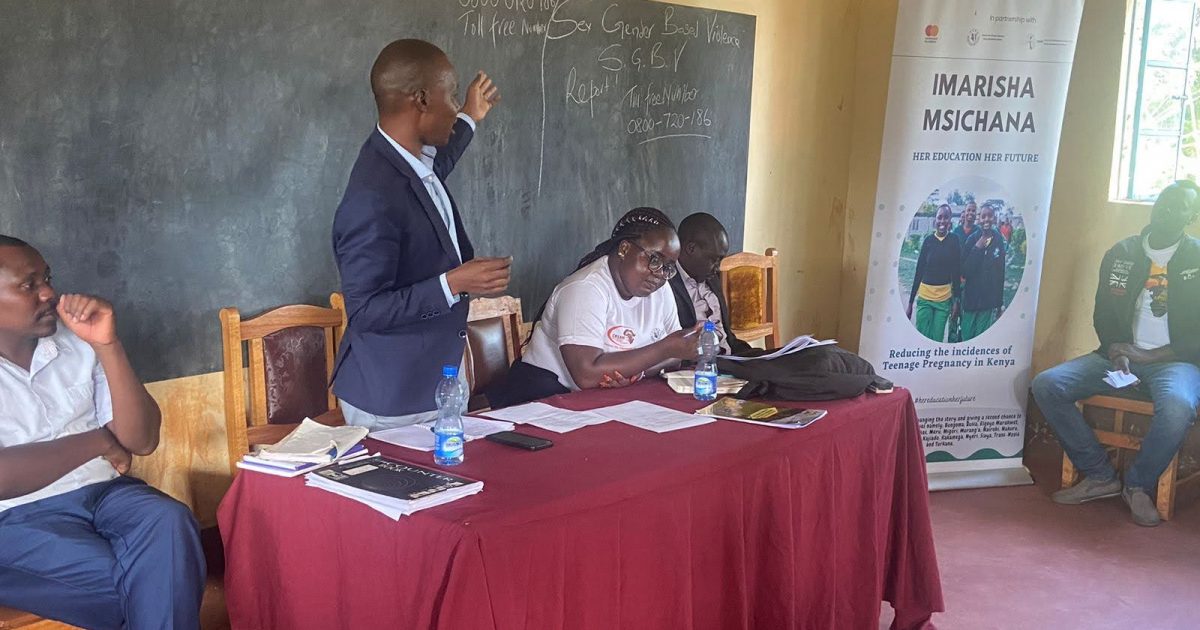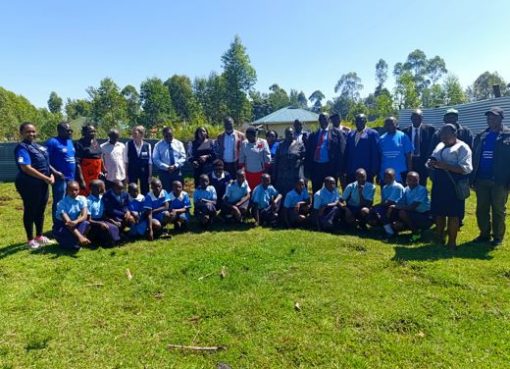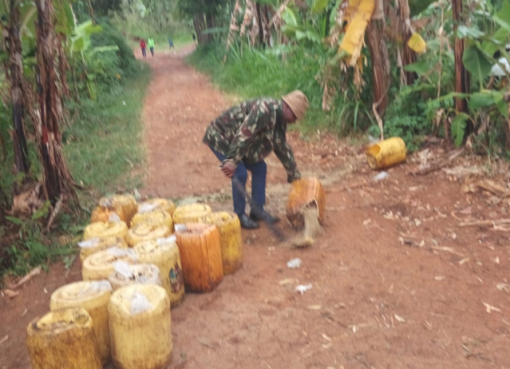Male engagement and sensitization is pivotal in efforts made by the government among other stakeholders in curbing teenage pregnancies, Assistant County Commissioner (ACC) for Kiru Division in Mathioya, Murang’a, Joseph Oloo, has said.
ACC said creating a pool of boys and young men who are disciplined and with changed attitudes and behavior, will have a ripple effect in getting more men involved in advocating against teenage pregnancy.
“Young boys and men are expected to shift from negatively being responsible for teenage pregnancies and instead, tap into their potential to prevent pregnancies, through abstinence from sex and/or practicing safe sex,” he said.
The ACC was speaking during a men’s forum in Kagumoini area, Mathioya Sub-county in Murang’a, that was organized by Forum for African Women Educationalists (FAWE) Kenya that aimed to sensitize men on their role in reducing the triple threat of HIV, Sexual Gender Based Violence (GBV) and majorly on teenage pregnancy.
FAWE Kenya is a non-governmental organization that is implementing the Imarisha Msichana project, which aims to significantly reduce the incidence of teenage pregnancy in Kenya.
Mr Oloo observed that drugs and substance abuse, which is mostly affecting the young men, is one of the causes that leads to teen pregnancies, besides poor parenting, peer pressure, financial problems among others.
“The National Government Administrative Officers (NGAO), have been conducting crackdowns of illicit brew in the County in the past few days in efforts to curb the menace of drugs and substance abuse among our people.” he said, adding they are urging the community to give out any information about any illegal activities.
The ACC while addressing over 40 participants who had representation from the Boda boda sector, the local Administration, religious leaders, and the school-going boys, said that cases of Sexual Gender Based Violence and other domestic issues can be reported on a toll free no. 0800 720 186.
Murang’a County has a high teenage pregnancy burden. Seven percent of girls aged 15 to 19 have often been pregnant, according to a data fact sheet from the Kenya Demographic and Health Survey 2022.
The KDHS Survey 2022 key indicators, show that the main drivers of teenage pregnancy include lack of education, poverty, harmful cultural practices, and barriers to accessing sexual and reproductive health services.
FAWE Kenya Murang’a Coordinator, Pauline Masese, said the Organization is engaging boys and young men in teenage pregnancy prevention programmes by sharing experiences, ideas, knowledge and content relevant to eradicating teenage pregnancies.
“We want men to know what they can do better by making them champions of girl’s rights hence, reduction of teenage pregnancies from a male perspective,” said Masese adding that they also agreed on action points to ensure that men understand their role in the triple threat.
Masese said one of the programmes that the organization is implementing to reduce teenage pregnancy in the country is the formation of Tuseme Clubs in schools.
She said that the clubs are used to empower boys and girls to understand their unequal gender positioning, and the need to support and accept gender equality as a human right.
“Tuseme is a Kiswahili word for “let us speak out”. It is an empowerment process designed to enable girls and boys to speak out about their problems, and how they can take action to solve them” she said.
She said FAWE Kenya is encouraging men and young boys to speak up and report any cases of violation and inequalities against girls and address the challenges so that a girl’s life and education is not disrupted.
“Men ought to speak up against any violations and inequalities against the girls and for young men to challenge retrogressive cultures and provide alternatives/good practices,” she said
Masese said their organization is advocating for the re-entry of teenage mothers back to school because they believe her education is her future.
“We support women and girls to acquire education for development at the County and National level. We implement programs that aim to empower girls and women through gender-responsive education” she said.
One of the participants, Denis Mutuiri, who is a father of two daughters, lauded the efforts made by FAWE Kenya in educating men and young boys on their role in reducing teenage pregnancies and being on the front lines in championing for girl’s rights.
“I have been well equipped with knowledge to support my daughters through school and in other aspects of their life to ensure that they grow up to become responsible women in the society,” he said.
He said parents and teachers need to educate young boys and girls more about living responsibly and provide a safe space where they can share about issues affecting them to seek guidance in solving them.
The Imarisha Msichana project is an initiative implemented by FAWE Kenya in partnership with the Mastercard Foundation.
The program is being implemented in 20 counties of; Nakuru, Nairobi, Machakos, Elgeyo Marakwet, Kiambu, Garissa, Bungoma, Kakamega, Nyeri, Migori, Murang’a, Kajiado, Narok, Homa-Bay, Trans-Nzoia, Nyandarua, Busia, Meru, Siaya, and Turkana.
By Anita Omwenga




